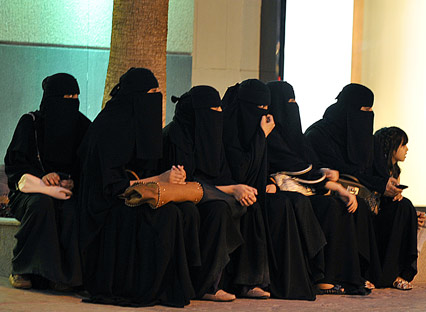TV presenter flees Saudi Arabia amid ‘indecent dress’ probe
Shereen al-Rifaie was reporting on end of driving ban on women when her abaya was blown open by wind

A free daily email with the biggest news stories of the day – and the best features from TheWeek.com
You are now subscribed
Your newsletter sign-up was successful
A TV reporter has fled Saudi Arabia after authorities accused her of dressing “indecently” for a broadcast about the end of the country ban on women driving.
The Muslim kingdom has launched an investigation into Shereen al-Rifaie, who works for Dubai-based Al Aan TV, amid claims that she violated the dress code for women.
Rifaie was reporting on the lifting of the ban on women driving in Saudi Arabia when her white abaya - a loose-fitting, full-length robe - was blown open by the wind to reveal white trousers and a white top below.
The Week
Escape your echo chamber. Get the facts behind the news, plus analysis from multiple perspectives.

Sign up for The Week's Free Newsletters
From our morning news briefing to a weekly Good News Newsletter, get the best of The Week delivered directly to your inbox.
From our morning news briefing to a weekly Good News Newsletter, get the best of The Week delivered directly to your inbox.
The Saudi General Commission for Audiovisual Media said the footage of the incident came to its attention after circulating on social media, reports Haaretz.
The clip sparked outrage online, with critics using the Arabic hashtag “naked_woman_driver_in_Riyadh”, says the BBC.
Following the launch of the probe, Rifaie shared an image on Snapchat of a plane ticket and her passport, indicating that she fled the country. She is quoted by Saudi news site Ajel as saying: “I was wearing decent clothes, and God will reveal the truth of what has been said to me.”
Ajel claims she has returned to the United Arab Emirates.
A free daily email with the biggest news stories of the day – and the best features from TheWeek.com
Under Saudi dress code, women must wear an abaya and hijab - a traditional Muslim headscarf - when out in public. Foreign women do not have to wear a hijab, but must wear an abaya. This dress code is legally imposed and, if broken, can lead to prosecution.
-
 Political cartoons for February 16
Political cartoons for February 16Cartoons Monday’s political cartoons include President's Day, a valentine from the Epstein files, and more
-
 Regent Hong Kong: a tranquil haven with a prime waterfront spot
Regent Hong Kong: a tranquil haven with a prime waterfront spotThe Week Recommends The trendy hotel recently underwent an extensive two-year revamp
-
 The problem with diagnosing profound autism
The problem with diagnosing profound autismThe Explainer Experts are reconsidering the idea of autism as a spectrum, which could impact diagnoses and policy making for the condition
-
 Epstein files topple law CEO, roil UK government
Epstein files topple law CEO, roil UK governmentSpeed Read Peter Mandelson, Britain’s former ambassador to the US, is caught up in the scandal
-
 Iran and US prepare to meet after skirmishes
Iran and US prepare to meet after skirmishesSpeed Read The incident comes amid heightened tensions in the Middle East
-
 Israel retrieves final hostage’s body from Gaza
Israel retrieves final hostage’s body from GazaSpeed Read The 24-year-old police officer was killed during the initial Hamas attack
-
 China’s Xi targets top general in growing purge
China’s Xi targets top general in growing purgeSpeed Read Zhang Youxia is being investigated over ‘grave violations’ of the law
-
 Panama and Canada are negotiating over a crucial copper mine
Panama and Canada are negotiating over a crucial copper mineIn the Spotlight Panama is set to make a final decision on the mine this summer
-
 Why Greenland’s natural resources are nearly impossible to mine
Why Greenland’s natural resources are nearly impossible to mineThe Explainer The country’s natural landscape makes the task extremely difficult
-
 Iran cuts internet as protests escalate
Iran cuts internet as protests escalateSpeed Reada Government buildings across the country have been set on fire
-
 US nabs ‘shadow’ tanker claimed by Russia
US nabs ‘shadow’ tanker claimed by RussiaSpeed Read The ship was one of two vessels seized by the US military